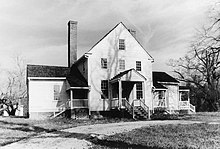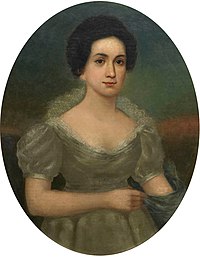John Tyler
His unexpected rise to the presidency posed a threat to the presidential ambitions of Henry Clay and other Whig politicians and left Tyler estranged from both of the nation's major political parties at the time.
After the British capture of Hampton, Virginia, in the summer of 1813, Tyler eagerly organized a militia company, the Charles City Rifles, to defend Richmond, which he commanded with the rank of captain.
He privately acknowledged his dissatisfaction with the position, as his opposing votes were largely symbolic and did little to change the political culture in Washington; he also observed that funding his children's education would be difficult on a congressman's low salary.
Randolph was a contentious figure; although he shared the staunch views on states' rights held by most of the Virginia legislature, he had a reputation for fiery rhetoric and erratic behavior on the Senate floor, which put his allies in an awkward position.
"[38] When the Twentieth Congress began in December 1827,[f] Tyler served alongside his Virginia colleague and friend Littleton Waller Tazewell, who shared his strict constructionist views and uneasy support of Jackson.
Tyler, who sympathized with South Carolina's reasons for nullification, rejected Jackson's use of military force against a state and gave a speech in February 1833 outlining his views.
[54] He received only 47 electoral votes, from Georgia, South Carolina and Tennessee, in the November 1836 election, trailing both Granger and the Democratic candidate, Richard Mentor Johnson of Kentucky.
A slaveowner from eastern Virginia, Tyler supported the existing system, but largely remained on the sidelines during the debate, not wishing to alienate any of the state's political factions.
The fact that Harrison lived on a palatial estate along the Ohio River and that Tyler was well-to-do was ignored, while log cabin images appeared everywhere, from banners to whiskey bottles.
Glee clubs sprouted all over the country, singing patriotic and inspirational songs: one Democratic editor stated that he found the songfests in support of the Whig Party to be unforgettable.
[71] Clay, though embittered by another of his many defeats for the presidency, was appeased by Tyler's withdrawal from the still-unresolved Senate race, which would permit the election of Rives, and campaigned in Virginia for the Harrison/Tyler ticket.
At dawn on April 5, Webster's son Fletcher, chief clerk of the State Department, arrived at Tyler's Williamsburg home to officially inform him of Harrison's death the morning before.
[87]Tyler delivered an informal written inaugural address to the Congress on April 9, in which he reasserted his belief in fundamental tenets of Jeffersonian democracy and limited federal power.
Believing it improper to continue distribution at a time when federal revenue shortage necessitated increasing the tariff, Tyler vetoed both bills, burning any remaining bridges between himself and the Whigs.
After listening to reports from his confidential agents, Tyler decided that the "lawless assemblages" had dispersed and expressed his confidence in a "temper of conciliation as well as of energy and decision" without the use of federal forces.
[132][121] In May 1842, the House demanded President Tyler's Secretary of War John Spencer hand over information of an investigation by the U.S. Army into the matter of alleged Cherokee frauds.
[137] Finally, in February 1845, with less than a month remaining in his term, Tyler's nomination of Samuel Nelson to Thompson's seat was confirmed by the Senate—Nelson, a Democrat, had a reputation as a careful and noncontroversial jurist.
[143] With the help of newly appointed Treasury Secretary John C. Spencer, Tyler cleared out an array of officeholders, replacing them with pro-annexation partisans, in a reversal of his former stand against patronage.
In exchange for an appointment as consul to Hawaii, journalist Alexander G. Abell wrote a flattering biography, Life of John Tyler, which was printed in large quantities and given to postmasters to distribute.
Also killed or mortally wounded were Virgil Maxcy of Maryland, Rep. David Gardiner of New York, Commodore Beverley Kennon, Chief of Construction of the United States Navy, and Armistead, Tyler's black slave and body servant.
Historian Edward P. Crapol later wrote that "Prior to the Civil War and the assassination of Abraham Lincoln", the Princeton disaster "unquestionably was the most severe and debilitating tragedy ever to confront a President of the United States".
[147] In what the Miller Center of Public Affairs considers "a serious tactical error that ruined the scheme [of establishing political respectability for him]",[150] Tyler appointed former Vice President John C. Calhoun in early March 1844 as his Secretary of State.
When the text of the treaty was leaked to the public, it met political opposition from the Whigs, who opposed anything that might enhance Tyler's status, as well as from foes of slavery and those who feared a confrontation with Mexico, which had announced that it would view annexation as a hostile act by the United States.
He had requested a simple burial, but Confederate President Jefferson Davis devised a grand, politically pointed funeral, painting Tyler as a hero to the new nation.
"[183] Tyler's assumption of complete presidential powers "set a hugely important precedent", according to a biographical sketch by the University of Virginia's Miller Center of Public Affairs.
The propriety of Tyler's action in assuming both the title of the presidency and its full powers was legally affirmed in 1967, when it was codified in the Twenty-fifth Amendment to the United States Constitution.
Monroe credits him with "achievements like the Webster–Ashburton treaty which heralded the prospect of improved relations with Great Britain, and the annexation of Texas, which added millions of acres to the national domain".
Crapol argued that Tyler "was a stronger and more effective president than generally remembered", while Seager wrote, "I find him to be a courageous, principled man, a fair and honest fighter for his beliefs.
[185] In a History Today article, Louis Kleber wrote that Tyler brought integrity to the White House at a time when many in politics lacked it, and refused to compromise his principles to avoid the anger of his opponents.
[196] Tyler's personal net worth is estimated to have exceeded $50 million when adjusting for inflation by modern standards (according to peak valuation circa 2020), but he became indebted during the Civil War, and died with a greatly reduced fortune.





















